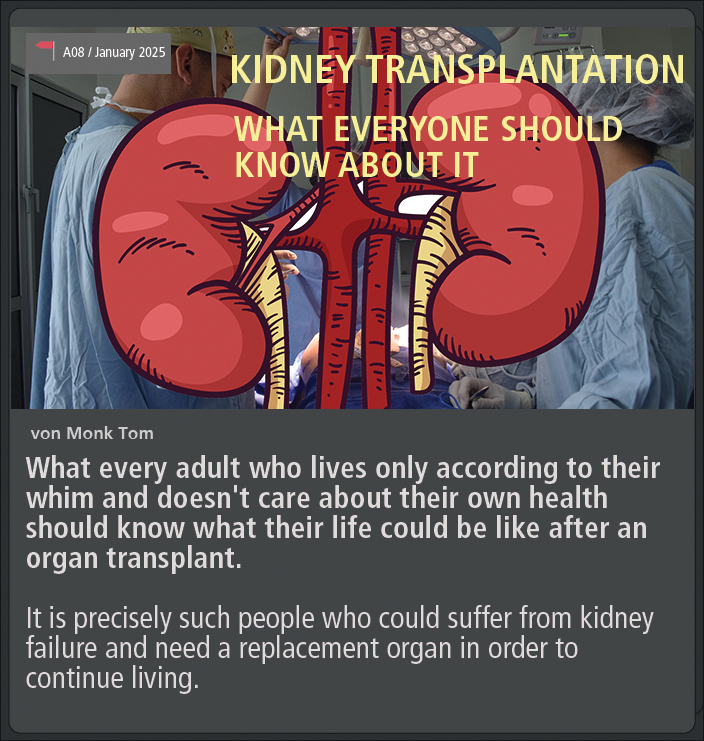KIDNEY TRANSPLANTATION


von Monk Tom
The consequences of a kidney transplant
Everything that comes next could have been avoided if you had switched to a healthy diet early on.
A kidney transplant today (as of January 2025) costs US dollars 400,000. During a kidney transplant, the function of the diseased kidney is replaced by a replacement kidney from another person. The surgeon transplants a kidney from either a dead person or a living person.
The kidney is the organ most commonly required for transplantation. If the kidneys do not function properly, it has serious effects on the entire body. Diabetes mellitus or high blood pressure are the most common causes of kidney damage. In severe cases, the function of the kidneys must be replaced either by blood washing (dialysis) or by transplantation of a donor kidney.
Figures and facts
After one year after the operation, around 90% of the donor kidneys are still working, and after five years, 75% of the donor kidneys are still working. After approx. 7 – 13 years the donor kidney must be replaced. Most patients no longer survive the second operation. (As of 2024)
1. Transplanted organs don't last forever.
While transplantation of a healthy organ to replace a diseased or failed organ can extend life, transplants have their limitations. A transplanted kidney lasts on average 10 to 13 years if the organ comes from a living donor and seven to nine years if it comes from a deceased donor.
2. A transplanted organ may bring with it a hidden disease.
Before the transplant, the organs are checked for common infections and diseases. This is intended to exclude potentially dangerous contamination. And although transmissible infections are very rare, they are suspected in about 1 percent of transplant cases.
3. The average cost of various organ transplants in the United States.
While most are expensive, some are very expensive. A kidney transplant costs just over $400,000.
The cost of an average heart transplant, on the other hand, can be up to $1.4 million.
Especially in the beginning, taking care of your health after a transplant can feel like a full-time job. And when it comes to caring for your new kidney, medications play a significant role. By taking immunosuppressants (anti-rejection drugs), your transplanted organ remains protected and is not attacked and rejected by your own immune system. Because the immune system recognizes the replacement kidney as a foreign body. The calcineurin inhibitors belong to the group of immunosuppressive drugs, which means they inhibit the activities of the immune system, including the formation of inflammatory messenger substances. In higher doses they are used internally (systemically) after organ transplants to suppress a rejection reaction. Unfortunately, these calcineurin inhibitors have the property of damaging the kidneys, which shortens the lifespan of the kidneys.
Important to know:
As an organ recipient, you will take immunosuppressive medication every day for your entire life. The general tumor risk is increased approximately threefold due to immunosuppression. Furthermore, the necessary anti-rejection medications can lead to diabetes mellitus and high blood pressure (hypertension), but can also damage the transplant and thus lead to slow kidney failure again. This is a key reason why the lifespan of a replacement kidney ends at 15 years. It can be said that death will occur after 15 years because the immunosuppressive drugs damage all organs in the body and the immune system is significantly weakened by the immunosuppressive drug.
Smoking, meat and sausage products as well as fatty fried foods, sugar and alcohol are prohibited.
So why not change your lifestyle to healthy ones sooner and pay attention to healthy kidneys. Everyone has the choice of which path they want to take for their health and well-being. I recommend you go “MY WAY OF LONGEVITY” and follow the tips from the green Carmina Gadelica Meducation Compass.
